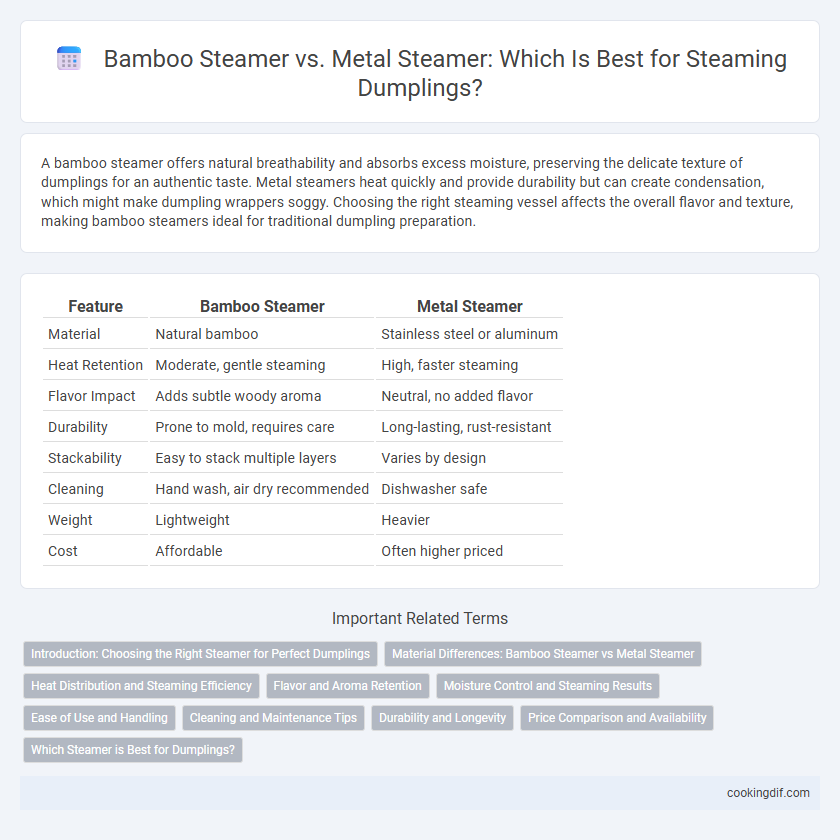A bamboo steamer offers natural breathability and absorbs excess moisture, preserving the delicate texture of dumplings for an authentic taste. Metal steamers heat quickly and provide durability but can create condensation, which might make dumpling wrappers soggy. Choosing the right steaming vessel affects the overall flavor and texture, making bamboo steamers ideal for traditional dumpling preparation.
Table of Comparison
| Feature | Bamboo Steamer | Metal Steamer |
|---|---|---|
| Material | Natural bamboo | Stainless steel or aluminum |
| Heat Retention | Moderate, gentle steaming | High, faster steaming |
| Flavor Impact | Adds subtle woody aroma | Neutral, no added flavor |
| Durability | Prone to mold, requires care | Long-lasting, rust-resistant |
| Stackability | Easy to stack multiple layers | Varies by design |
| Cleaning | Hand wash, air dry recommended | Dishwasher safe |
| Weight | Lightweight | Heavier |
| Cost | Affordable | Often higher priced |
Introduction: Choosing the Right Steamer for Perfect Dumplings
Bamboo steamers offer natural breathability and moisture absorption, creating a gentle steaming environment that preserves the delicate texture and flavor of dumplings. Metal steamers provide rapid heat conduction and durability, ensuring consistent temperature control for evenly cooked dumplings with a slightly firmer texture. Selecting between bamboo and metal steamers depends on desired dumpling quality, cooking speed, and ease of maintenance.
Material Differences: Bamboo Steamer vs Metal Steamer
Bamboo steamers are crafted from natural bamboo fibers, offering lightweight construction and superior moisture absorption that prevents condensation from dripping onto dumplings, preserving their delicate texture. Metal steamers, often made from stainless steel or aluminum, provide durable, heat-conductive surfaces that heat quickly and evenly but may cause more condensation buildup, leading to soggy dumplings if not managed properly. The choice between bamboo and metal steamers affects cooking performance, with bamboo favored for traditional, gentle steaming and metal preferred for durability and faster heating.
Heat Distribution and Steaming Efficiency
Bamboo steamers provide gentle, even heat distribution, allowing steam to circulate freely and prevent condensation from dripping onto dumplings, preserving their texture. Metal steamers heat up quickly and offer precise temperature control but may cause uneven heat spots, potentially leading to inconsistent steaming results. Choosing between bamboo and metal steamers impacts steaming efficiency, with bamboo excelled in moisture control and metal favored for rapid heating and durability.
Flavor and Aroma Retention
Bamboo steamers excel in retaining the natural aroma and subtle flavors of dumplings due to their porous structure that allows moisture to escape, preventing sogginess and preserving texture. Metal steamers, while durable and faster in heat conduction, can cause condensation to drip back onto dumplings, potentially diluting delicate flavors and aroma. Choosing a bamboo steamer enhances the sensory experience of dumplings by maintaining optimal moisture balance and promoting a fragrant, authentic taste.
Moisture Control and Steaming Results
Bamboo steamers excel at moisture control by allowing steam to circulate freely while absorbing excess condensation, preventing sogginess and preserving the dumpling's delicate texture. Metal steamers, often made of stainless steel, create a tighter seal that can trap moisture, sometimes resulting in wetter, less airy dumplings. Choosing a bamboo steamer enhances optimal steaming results with evenly cooked dumplings that maintain their shape and flavor.
Ease of Use and Handling
Bamboo steamers offer lightweight construction and natural materials that provide easy handling and quick temperature monitoring, enhancing user comfort during dumpling preparation. Metal steamers, typically made from stainless steel, are more durable and heat conductors but tend to be heavier, which may make them less convenient for frequent use. The choice between bamboo and metal steamers depends on balancing the ease of handling and the durability needed for regular steaming tasks.
Cleaning and Maintenance Tips
Bamboo steamers require gentle cleaning with a soft brush and mild soap to prevent splintering and retain their natural aroma, while metal steamers can be scrubbed with abrasive sponges and dishwasher-safe detergents to remove residue efficiently. To maintain bamboo steamers, avoid prolonged soaking and ensure thorough drying to prevent mold growth, whereas metal steamers benefit from regular descaling and drying to prevent rust and corrosion. Proper cleaning and maintenance extend the lifespan of both steaming vessels and ensure safe, flavorful dumpling cooking.
Durability and Longevity
Bamboo steamers offer a natural, breathable steaming environment that preserves the dumplings' texture but are susceptible to warping and mold over time, requiring careful maintenance. Metal steamers, typically made from stainless steel, boast superior durability and resistance to rust, ensuring longevity with minimal upkeep under consistent use. Choosing between bamboo and metal steamers depends on prioritizing traditional flavor preservation against long-term durability and ease of cleaning.
Price Comparison and Availability
Bamboo steamers generally cost between $15 and $40, offering affordability and widespread availability in Asian markets and online platforms. Metal steamers, priced around $25 to $60, provide greater durability but at a higher initial investment and are commonly found in kitchen supply stores and e-commerce websites. Availability for both steamers varies by region, with bamboo steamers more prevalent in traditional Asian stores and metal steamers favored in Western cooking outlets.
Which Steamer is Best for Dumplings?
Bamboo steamers provide a natural, breathable environment ideal for steaming dumplings, preventing sogginess by allowing excess moisture to escape, which helps maintain the dumplings' delicate texture. Metal steamers, often made from stainless steel, heat quickly and evenly, offering durability and easier cleaning but can cause condensation to drip directly onto dumplings, potentially making them soggy. For authentic texture and flavor, bamboo steamers are preferred by many chefs for dumpling preparation, while metal steamers serve as practical alternatives in terms of convenience and longevity.
Bamboo Steamer vs Metal Steamer for Steaming Vessel Infographic

 cookingdif.com
cookingdif.com